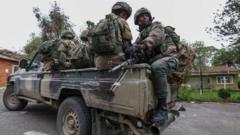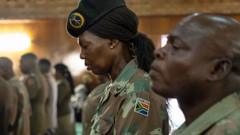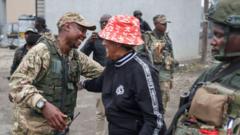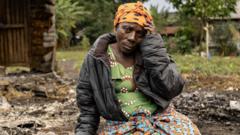After suffering a humiliating defeat against M23 insurgents in Goma, Romanian mercenaries, contracted to earn lucrative salaries, find themselves marooned and disillusioned, highlighting the precarious nature of foreign military intervention in DR Congo.
Romanian Mercenary Mission in DR Congo Ends in Downfall

Romanian Mercenary Mission in DR Congo Ends in Downfall
Nearly 300 Romanian mercenaries hired to support the Congolese army in Goma face disaster as they surrender to rebel forces amidst overwhelming odds.
In a stunning turn of events, around 300 Romanian mercenaries, enlisted to bolster the Democratic Republic of Congo's (DRC) armed forces, have surrendered to rebel troops in the eastern city of Goma following a ferocious attack. Their dreams of lucrative pay totaling approximately $5,000 (£4,000) per month have evaporated as they now face a grim reality.
The mercenaries were ostensibly called in to counter the M23 rebels, a group supported by Rwanda that argues they aim to protect the rights of the DRC's minority Tutsi population. However, during the intense fighting that erupted in Goma over the weekend, the Romanian soldiers sought refuge within a UN peacekeeping base, unable to rally the Congolese troops to hold the line.
According to Constantin Timofti, identified as the group's coordinator, the Congolese military surrendered, forcing their withdrawal. "The M23 rebels were supported by Rwandan forces and advanced with superior military equipment," Timofti explained to Romanian media.
The aftermath of the confrontation saw a tense negotiation led by officials from Romania's foreign ministry, resulting in the M23 turning over the detained mercenaries, who were mischaracterized as mere private contractors. The unsettling footage shared by journalists documented the Romanians being searched and detained by M23 commanders as they crossed into Rwanda.
Inquiries into their recruitment revealed significant pay disparities, with Romanian contractors living affluent lives in stark contrast to Congolese soldiers receiving around only $100 monthly, often unpaid. One notable exchange featured M23 commander Willy Ngoma confronting a captured Romanian, drawing attention to the stark economic differences in their respective military roles.
Documents obtained by the BBC corroborate the mercenaries' contracts, promising substantial compensation based on strict confidentiality. The harsh reality, however, reflected their experiences on the ground, where many Romanian recruits performed far more combat duties than anticipated. One former mercenary conveyed dissatisfaction with the dangerous conditions, calling into question the adequacy of their military training.
The failure of this mission exemplifies larger issues engulfing the Congolese military structure, marred by lack of strategic organization and overshadowed by the presence of various foreign entities. Richard Moncrief from the International Crisis Group highlighted this juxtaposition, asserting that the multiplicity of forces complicates military objectives.
Throughout this debacle, what remains consistent is the precarious nature of relying on foreign mercenaries in conflict zones. The disillusionment felt by the Romanians serves as a harrowing reminder of the risks entailed when ventures into complex military engagements are driven solely by fiscal allure, leaving soldiers with careers and lives forever altered.



















